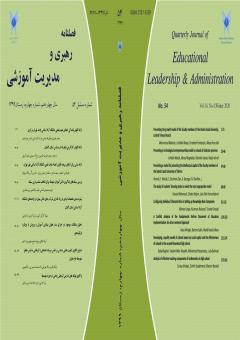Identifying the components of the professional education and development model of teachers
Subject Areas :ghasem bamiri 1 , Mohsen Dibaei Saber 2 , سیف اله فضل الهی 3
1 - Ph.D. student of Educational Management Department, Qom Branch, Islamic Azad University, Qom, Iran.
2 - Associate of Shahed University Tehran, Iran.
3 - Associate Professor, Department of Educational Sciences, Qom Branch, Islamic Azad University, Qom, Iran.
Keywords: Keywords: education, professional development of teachers, entrepreneurial approach.,
Abstract :
Purpose: The purpose of the present study was to identify the components of the model of professional education and development of teachers based on the entrepreneurial approach.
Method: The research method was a mixed exploratory approach in two phases, qualitative and quantitative, in which thematic analysis method was used in the qualitative part and survey descriptive analysis was used in the quantitative part. The statistical population includes all professors of Farhangian, State, and Azad universities and teachers of Chaharmahal and Bakhtiari provinces. In the qualitative part, 15 people were interviewed at the saturation point and in the quantitative part, 230 people were selected by purposive sampling. The measurement tool in the qualitative part was a semi-structured interview and in the quantitative part a 127-question questionnaire was made by the researcher. To analyze the information in the quantitative part, spss-26 software and smart pls software were used, and in the qualitative part, based on the grand theory approach, theme analysis was used.
Results: The findings showed that there were six elements of the curriculum based on qualitative data: logic, purpose, content, educational strategy, educational materials, and evaluation.
Conclusion: The implementation of teachers' training and professional development based on the entrepreneurial approach will lead to the development of teachers' knowledge and the growth of their individual skills, and they will realize their capabilities and talents.
حسینی، فاطمه. علی عسگری، مجید.، قلتاش، عباس.، و احدبیگی، فاطمه. (1401). طراحی و اعتباربخشی مدل برنامه درسی کارآفرینی اجتماعی در آموزش عالی ایران. فصلنامه پژوهش در نظامهای آموزشی، پیاپی ۲۵: 145-174.
داوودی راد، دانیال. عباسپور، عباس، و میگون پوری، محمدرضا. (1400). طراحی و اعتباریابی الگوی کارآفرینی اجتماعی نظام آموزش عالی ایران. فصلنامه پژوهش در نظامهای آموزشی، پیاپی ۵۴: 33-50.
عبداللهی، بیژن. سادین، علی¬اکبر.، نوه¬ابراهیم، عبدالرحیم.، و عباسیان، حسین. (۱۴۰۱). طراحی مدل بالندگی حرفه¬ای اعضاء هیئت علمی در دانشگاه فرهنگیان با رویکرد داده بنیاد و پارادایم آمیخته اکتشافی. مدیریت بر آموزش سازمان¬ها، ۱۱(۳): ۸۳-۴۱.
کشاورزی، فهیمه. جاودانی، محمد.، و بدخشان، مجید. (۱۴۰۰). طراحی چارچوب شایستگی¬های حرفه-ای معلمان کارآفرین. نوآوری¬های آموزشی، 20 (4): ۵۴-۳۵.
کمالی، ندا. سیف نراقی، مریم. و نادری، عزت اله. (۱۳۹۹). طراحی الگوی درس کارآفرینی در دوره کارشناسی آموزش ابتدایی مبتنی بر ویژگیهای ذهنی- روانی کارآفرینان آموزشی. فصلنامه توسعه آموزش جندی شاپور، 11 (2): ۹۰-۷۸.
مرادیان، پریسا. سلیمی، مهتاب. و جهانیان، رمضان. (۱۳۹۹). شناسایی عوامل توسعه کارآفرینی آموزشی در نظام آموزش عالی. فصلنامه علمی آموزش علوم دریایی، 35 (2): ۲۱.
Acton, R. (2019). Mapping the evaluation of problem-oriented pedagogies in higher education: A systematic literature review. Education Sciences, 9(4): 1–15.
Banha, F., Luís, S. C., & Adão, F. (2022). Entrepreneurship Education: A Systematic Literature Review and Identification of an Existing Gap in the Field. Education Sciences, 12: 336.
Bell, R. (2020). Adapting to constructivist approaches to entrepreneurship education in the Chinese classroom. Stud. High. Educ, 45: 1694–1710.
Chyekoh, H. (2019). Testing hypotheses of entrepreneurial characteristics: A study of Hong kong MBA Students. Journal of managerial psychology. 11(3): 12-25.
Cui, J. (2021). The Impact of Entrepreneurship Curriculum with Teaching Models on Sustainable Development of Entrepreneurial Mindset among Higher Education Students in China: The Moderating Role of the Entrepreneurial Climate at the Institution. Sustainability, 13, 7950.
Colombelli, A., Loccisano, M., Panelli, A., Orazio, A. Pennisi, M., & Francesco, S. (2022). Entrepreneurship Education: The Effects of Challenge-Based Learning on the Entrepreneurial Mindset of University Students. Administrative Sciences, 12: 10.
Cui, J. (2021). The Impact of Entrepreneurship Curriculum with Teaching Models on Sustainable Development of Entrepreneurial Mindset among Higher Education Students in China: The Moderating Role of the Entrepreneurial Climate at the Institution. Sustainability, 13: 7950.
Ferreira, J., Fayolle, A., & Ratten, V. (2018). Entrepreneurial universities: Collaboration, education and policies. London: Routledge, ISBN 9781786432452.
Guerrero, M., Urbano, D., & Gajón, E. (2020). Entrepreneurial university ecosystems and graduates’ career patterns: Do entrepreneurship education programmes and university business incubators matter? Journal of Management Development, 39(5): 753–775.
Heliona, M., & Cungu, J. (2023). Entrepreneurship Education, a Challenging Learning Process towards Entrepreneurial Competence in Education. Administrative Sciences, 13: 22.
Hero, L. M. (2018). Innovation tournament as a multidisciplinary activity system to promote the development of innovation competence. Ammattikasvatuksen aikakauskirja, 19(4): 8-31.
Jeou-Shyan, H., Han-Liang, H., Horng, H.L. Hsiao, C.H. Liu, S.F. & Chou, K. (2021). Learning innovative entrepreneurship: Developing an influential curriculum for undergraduate hospitality students. Journal of Hospitality ,29: 1132.
Jerez Yàñez, Ó., Aranda Càceres, R, Corvalán Canessa, F., González Rojas, L., & Ramos Torres, A. (2019). A teaching accompaniment and development model: Possibilities and challenges for teaching and learning centers. International Journal Acad. Dev. 24: 204–208.
Kim, S., Raza, M., Seidman, E. (2019). Improving 21-st century teaching skills: The key to effective 21-century learners. Research in Comparative and International Education, 14(1): 99-117.
Mei, W. & Symaco, L. (2020). University-wide entrepreneurship education in China’s higher education institutions: Issues and challenges. Stud. High. Educ,4: 1–17.
Shahin, M. (2021). The impact of a STEM-based entrepreneurship program on theentrepreneurial intention of secondary school female students. International Entrepreneurship and Management Journal, 32 (4): 435.
UNESCO. (2015). Transforming technical and vocational education and training: building skills for work and life [Paper presentation]. Third International Congress on Technical and Vocational Education and Training, Shanghai, China.
Wu, W., Wang, H., & Wu, Y. J. (2020). Internal and external networks, and incubatees’ performance in dynamicenvironments: entrepreneurial learning’s mediating effect. The Journal of Technology Transfer, 46(6): 1707-1733.
Yuan, C. H., & Wu, Y. J. (2020). Mobile instant messaging or face-to-face? Group interactions in cooperative simulations. Computers in Human Behavior, 113, 106508.


